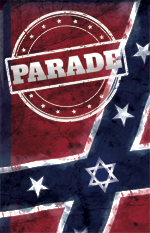Parade’s Telling of a Lynching in the South Resonates Now More Than Ever
by Joel Beers
“Local media sensationalism ignites intense national coverage. Grandstanding politicians sense opportunism, and inflammatory rhetoric helps to polarize public opinion. The rift between rural and urban America is revealed. And a proud community desperately tries to hold itself together.”
“The Chance Theater’s production is the third in OC since 2013, and according to Music Theatre International (www.mtishows.com), which tracks these kinds of things, there are 10 either in production or planned across the country by the end of the year.”
“‘We’re not expecting a great audience turnout,’ says Oanh Nguyen, the Chance’s artistic director. “…while it’s important that we don’t tell people what to feel about it, we think it’s extremely relevant to what is happening today. . . . And it is an example of the power of musical theater to not just tell uplifting [stories], but to also tell complex and important stories.’
‘Considering the political climate right now, this absolutely could have been written yesterday,’ says director Kari Hayter, a theater instructor at Cal State Northridge who staged Parade there last year. “It’s about a community struggling to keep alive, but with politicians trying to win them over in the middle of a climate that is full of intolerance and injustice. People’s emotional levels are high, tensions are high, and it’s a difficult time.’
The play begins in Atlanta on Confederate Memorial Day in 1913. The next day, a young girl is found murdered in the basement of a pencil factory, and its manager, Leo Frank, a transplanted Brooklyn Jew, is the prime suspect. He’s fingered based on circumstantial evidence and highly dubious testimony.”
“That trial—as well as the musical—become a real-life metaphor of two of America’s most enduring and notorious character traits: race and urban-rural conflict.
…his trial and its aftermath resulted in the creation of two rather important footnotes in American history, the creation of the Anti-Defamation League and the resurgence of the Ku Klux Klan. But Parade is ultimately a play about people, and it offers all the participants something that’s in very short supply in 2017 America.”
“‘The people in Parade want to play a part in their community so badly,” Hayter adds. “And I think Americans still want to be part of a [bigger] community, it’s what they believe in. And that’s where the conflict and disagreement and friction come from.’
Hayter’s stripped-down concept of the play focuses on the people in that community. ‘There isn’t any blinding theatricality to it,’ she says. ‘There’s nothing masking anything. It’s a very raw production—skeletal, really. . . . The actors are pretty much naked out there, and a lot relies on their ability to tell the story. It’s very exciting and, I think, a very different Parade than people would expect.’
“‘I would hope people maybe see themselves in this story and how they form their decisions and judgments and how we are so quick to believe the media,’ Hayter says. ‘As dark of a musical as it is, I do feel it’s inspiring, and I hope it encourages people to approach their own views a little differently and be a bit more open-minded in this time of racial tension and this political climate. If this helps people to open their hearts and minds in a different way, then I think we’ve done our job.'”
Leave a Reply

